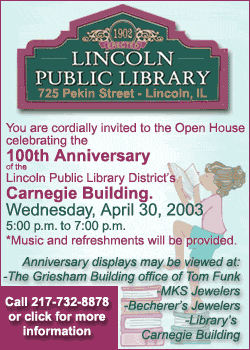|
At the end of a long meeting during
which they heard complaints from developers and a warning from the
city treasurer, and although it is almost certain the city will have
a deficit budget for 2003-04, all nine aldermen voted to support
borrowing money for infrastructure for the proposed 63.25-acre
industrial park northeast of the city.
"Somebody has to say yes, let's do
something to make Lincoln grow," Alderman Steve Fuhrer said before
the vote.
"The economy is bound to turn around
sometime, and I'd like to see Lincoln be ready," added Alderman Verl
Prather.
In spite of this positive step, many
questions about the proposed park are still unanswered, as city
attorney Bill Bates pointed out. The final motion to provide the
$1.1 million was contingent upon several conditions suggested by
Bates: on the acquisition of the land by Logan County or some other
body, its annexation to the city and also by the city's ability to
get a loan for the project.
The Logan County Board has not yet
agreed to buy the land and is currently involved in a dispute with
the Economic Development Council, the group that put the industrial
park proposal together. The board is presently withholding its
annual funding of $25,000 for the EDC because it contends EDC
meetings should be open to the public.

City Treasurer Les Plotner also posed
some questions to the council, advising them to get more information
before making a commitment.
"I think you need to explore this
before you jump. Is there a sound estimate on what it will really
cost to go out there?" he asked, referring to the sewer extension to
the proposed site at Kruger Road and Business 55. He also wanted to
know who would own the land if it is purchased by the county,
whether the city would get the revenue from any development and what
contribution the present landowners will make to the industrial
park.
"If all this information is available,
why don't people know about it?" he asked.
Plotner also warned against using
revenue from the 0.5 percent sales tax increase that voters approved
April 1, pointing out that money was to be used to improve existing
infrastructure.
Attorney Doug Muck questioned whether
the city would really get the favorable loan rates EDC director Jeff
Mayfield gave the council at its work session last week. Mayfield
said he and Mayor Beth Davis had met with representatives of seven
lending institutions in the county and presented figures for a
20-year loan at 3 percent, with initial payments of only about
$30,000.
Muck said he has talked to several bank
presidents and believed the proposal had been discussed only in
"vague terms."
"Be sure you have a loan commitment in
place before you spend city money," he advised.
Muck said he and fellow developer Henry
Spellman had "a little bit of a bad taste in our mouths" about the
present project because the city had failed to help them with
proposed developments in the past.
"We would have brought in projects that
would have promoted economic development," he said. "We've had
prospects ready to start a business and been turned away."
In the 1980s, he said, the city refused
to fund a $30,000 sewer extension to a property on the west side
which would have brought in a laboratory making spackling compound.
Later, about 1990, the city refused to allow the developers to build
a road to another industrial site. He said they needed to build only
200 feet of road but the city insisted they build 1,000 feet. He
also said they have never been able to convince the city to build a
road connecting Fifth Street and Woodlawn Road, which would open up
600 or 700 acres for development.

[to top of second column in
this article] |

"Muck made a good presentation,"
Alderman Benny Huskins said. "I'm sure the council is willing to
work with you in any way," he told Muck.
Mayfield and several other aldermen
also pledged to help Muck and Spellman. Mayfield has emphasized that
the EDC is supporting development city- and countywide, not just at
the north-side site.
Mayor Beth Davis pointed out that it is
the north-side site that prospective developers are currently
interested in. Both Mayfield and former EDC director Mark Smith have
emphasized that right now developers are looking at the north side
because they need a site not close to residential or retail
development. Clients also want a site that is already developed so
they don't have to wait for infrastructure, and if such a site is
not available, they will move on to other communities, Mayfield said
Jerry Johnson of Atlanta, a member of
EDC for about 20 years, said Atlanta bought seven acres of land for
an industrial site and now has a trucking company, a motel and other
revenue-producing businesses.
"What Mr. Muck is talking about is in
the past. If we don't take positive steps now, we are going back
into the past."
Johnson said the EDC is also willing to
help Muck and others develop the west side.
Responding to questions about the
actual cost of the sewer extension, Grant Eaton, sewer plant
manager, said that to get firm figures he would have to know the
amount of flow the system needed to handle, how many businesses
would be involved and the exact route the extension would take.
He said a lift station, which will be
needed, will cost about $150,000, and each linear foot of sewer line
will also cost about $150,000.
He also said sewer lines will have to
be upgraded if more development takes place on the west side but
conceded that a west-side upgrade would be less expensive than the
north-side site.
Mayor Beth Davis, a supporter of the
EDC plan, said both the water company and AmerenCILCO are interested
in participating in the proposed development.
Several aldermen praised Mayfield, who
has served as EDC director for only about three months, for his work
and his enthusiasm.
"I was excited when Mr. Mayfield came
on board. We need somebody to bring people together. Everybody is
working against everybody else, and somebody needs to take this
first step," Alderman Bill Melton said.
Mayfield said last week that he is
hopeful development will come quickly and pay or at least help pay
off the $1.1 million loan without dipping into city coffers.

Even though it recently cut six
employees, the city is facing a deficit for the coming fiscal year.
Revenues are expected to be $3,902,068, with expenditure requests
coming to $4,086,245. The $184,177 deficit may be reduced if all
four unions representing city workers agree to a new health
insurance plan that can save the city another $100,000.
"You might think this is the worst time
to do something," Prather said. "Probably it's the best time because
we've got to do something to get more revenue." He noted that the
city will be able to take advantage of the historically low interest
rates right now.
"I don't know how many times I've heard
people here say, ‘Why doesn't the city do something?'" council
member Marty Neitzel said.
"As the
youngest council member, with a new family, I support this," said
Alderman Pat Madigan. He said he had lived away from Lincoln for a
time but had always wanted to come back and keep his family here.
[Joan Crabb]
|